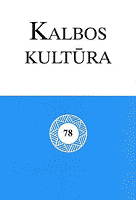Veiksmažodinių daiktavardžių pateikimas dabartinės lietuvių kalbos žodynuose
Deverbal nouns in the dictionaries of contemporary Lithuanian
Author(s): Vilija SakalauskieneSubject(s): Language and Literature Studies
Published by: Lietuvių Kalbos Institutas
Keywords: Deverbal nouns; contemporary Lithuanian; dictionaries
Summary/Abstract: The paper discusses the treatment of deverbal nouns in the dictionaries of contemporary Lithuanian. The category of verbal abstracts centres round the derivatives with the suffix -imas/-ymas, which is the most productive type to derive names of actions. Frequently, the change of the word form involves exclusively a change in the grammatical meaning, with the lexical meaning remaining the same. Hence the regular derivatives in the entries of the underlying verbs in all editions of the Dabartinės lietuvių kalbos žodynas (Dictionary of Contemporary Lithuanian). However, not all abstract nouns derived from the verb with the suffix -imas/-ymas have exclusively the meaning of an action. Some have acquired the meaning of the result, place, instrument or means of an action or any other concrete meaning. Part of the names of actions acquire additional semes, but refer to abstract things. It is important to take into consideration the fact that a derivative is not based only on the meaning of the underlying word. Hence, abstract deverbal nouns in the newly prepared Dictionary of Contemporary Lithuanian are given in separate entries with references to the underlying verb and the number of meaning. The dictionary also discusses the derivatives, which have acquired the meaning of the result, place of action or any other concrete meaning. Such principles provide an opportunity to make a strict selection in accordance with the lexical norms and actual use. It is important to note that not all meanings of prefixed verbs serve as derivational bases of deverbal abstract nouns.
Journal: Bendrinė kalba (iki 2014 metų – Kalbos kultūra)
- Issue Year: 2005
- Issue No: 78
- Page Range: 153-161
- Page Count: 9
- Language: Lithuanian

